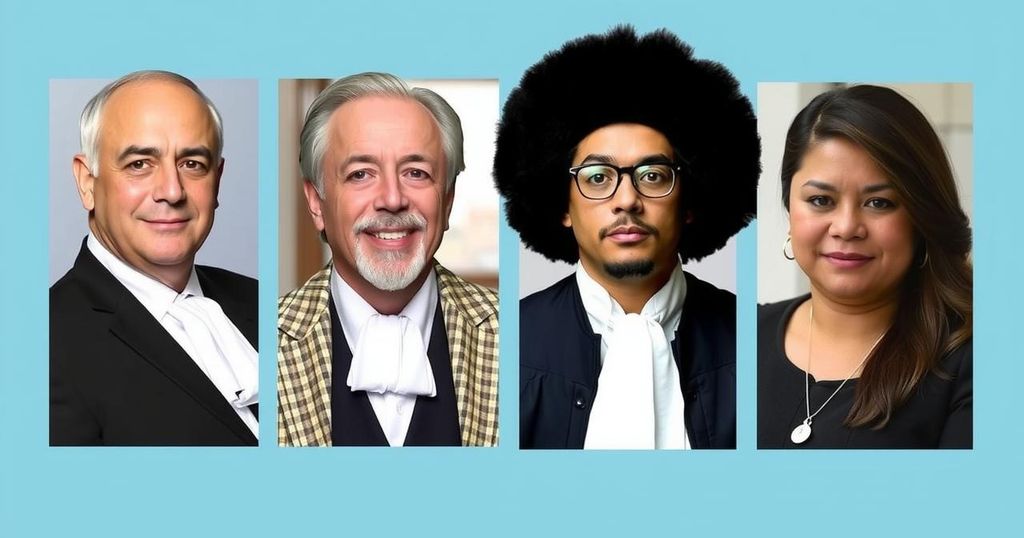World news
ANDRES MANUEL LOPEZ OBRADOR, ASIA, ASSOCIATED PRESS, BOLIVIA, CONSTITUTIONAL COURT, CORRUPTION, CUBA, DEMOCRACY, EL SALVADOR, ELECTIONS, EV, EVO MORALES, GOVERNANCE, LATIN AMERICA, LOPEZ OBRADOR, LUIS ARCE, MEXICO, NORTH AMERICA, PHILIPPINES, SOUTH AMERICA, THE ASSOCIATED PRESS
Lena Nguyen
0 Comments
Bolivia Moves Forward with Divisive Judicial Elections Amid Controversy
Bolivia is conducting its controversial judicial elections, unique in the world, where citizens vote for top judges. Campaigning is banned, leading candidates to adopt creative methods of gaining visibility. Detractors criticize the electoral system for politicizing the judiciary, complicating voters’ decisions. Only four of nine judicial seats are contested, amid concerns over the legitimacy and independence of the selection process, raising questions about the future of Bolivian democracy.
Bolivia is set to hold its divisive judicial elections, a unique event where voters choose their top judges. With campaigning effectively banned, candidates have resorted to subtle propaganda, infiltrating everyday products to garner attention in a country where many voters remain ill-informed about the vast array of nominees. This election is a reflection of Bolivia’s controversial electoral system for judicial positions, a model that has drawn criticism both nationally and internationally for undermining judicial independence and politicizing the courts. Former President Evo Morales introduced this voting system in 2009, a move recently mirrored by Mexico’s President Andres Manuel Lopez Obrador amidst widespread dissatisfaction and allegations of corruption in the judiciary.
However, amid the political turmoil and power struggles, Bolivian citizens express their disenchantment. Many voters, facing a complex ballot riddled with unfamiliar names, resort to random selection methods, as highlighted by 25-year-old architecture student Marisol Nogales who stated she might “flip a coin” when casting her vote. As the vice president of Bolivia’s electoral tribunal, Francisco Vargas, cautioned, this electoral process has devolved into a contentious affair, straying from its intended simplicity.
The Constitutional Court’s recent decision to postpone the elections has aggravated tensions within the ruling party and further illuminated the entanglement of judicial governance with political maneuvering. Critically, only four out of nine positions on the Constitutional Court are up for election, ensuring that a majority of the judges will remain in power regardless of the outcome. Observers predict the voting turnout will reflect the previous elections’ low participation rates, where many voters expressed frustration over the opaque selection of nominees associated with Morales’ agenda.
This election comes at a pivotal moment for Bolivia, as the legitimacy of the elected judges remains under scrutiny, informed by the contentious history of judicial actions such as the endorsement of Morales’ fourth-term candidacy, which contravened constitutional limits. As other nations observe the electoral process, the implications for democracy and judicial integrity in Bolivia may resonate beyond its borders, with significant interest from Mexico’s newly inaugurated president who is keen to learn from this electoral experience.
Bolivia is unique in conducting elections for top judicial officials, a practice that has raised numerous concerns regarding the political integrity and independence of its judiciary. Introduced under the administration of Evo Morales in 2009, this electoral system has faced widespread criticism for fostering a culture where judges are seen as political appointments rather than impartial arbiters of the law. The current upheaval arising from political factions vying for judicial control has been underscored by the recent postponement of the elections, which raises questions about both the legitimacy of the judges and the electoral process itself.
The upcoming judicial elections in Bolivia serve as a critical test of the country’s commitment to democratic principles and an independent judiciary. With a history of controversial judicial appointments and public skepticism towards the electoral system, the outcomes may have profound implications for Bolivia’s political landscape and judicial integrity. Observers remain cautious as the elections unfold, keeping a close watch on the potential repercussions for similar systems in neighboring countries.
Original Source: www.voanews.com




Post Comment